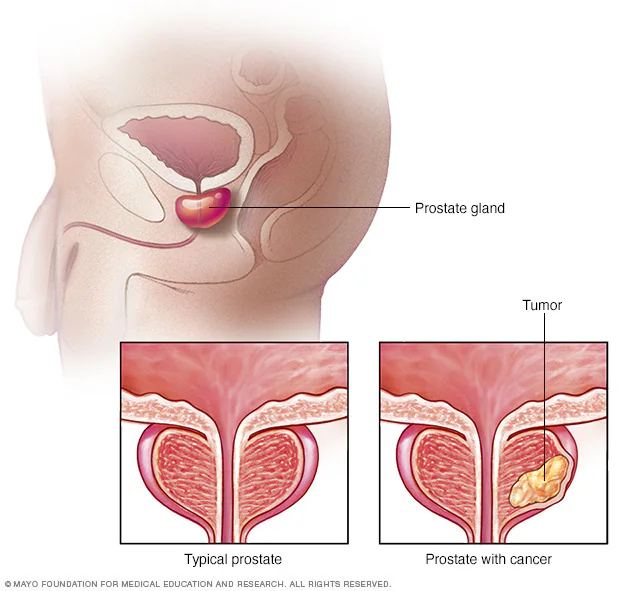Prostate Cancer
Prostate cancer is a type of cancer that occurs in the prostate, a small walnut-shaped gland in men that produces seminal fluid. It is one of the most common cancers in men. Prostate cancer often grows slowly and may not cause significant harm, but some types can be aggressive. Here are some key points about prostate cancer

- Risk Factors:
- Age: The risk increases with age, with the majority of cases diagnosed in men over 65.
- Family history: Having a close relative with prostate cancer increases the risk.
- Race: African-American men have a higher risk of developing prostate cancer compared to other racial and ethnic groups.
- Genetics: Certain gene mutations may increase the risk.
- Diet: High intake of red meat and high-fat dairy products may be associated with an increased risk.
- Signs and Symptoms:
- Early-stage prostate cancer may not cause noticeable symptoms.
- Advanced prostate cancer may lead to urinary problems, such as difficulty urinating, weak urine flow, blood in the urine, or pain during ejaculation.
- Screening and Diagnosis:
- Prostate-Specific Antigen (PSA) Test: This blood test measures the level of PSA, a protein produced by the prostate. Elevated PSA levels may indicate prostate issues, including cancer.
- Digital Rectal Examination (DRE): A physical examination in which a healthcare provider checks the prostate for abnormalities.
- Biopsy: If abnormalities are detected in PSA levels or DRE, a biopsy may be performed to confirm the presence of cancer.
- Staging:
- Staging helps determine the extent of the cancer and guides treatment decisions.
- Types of Prostate Cancer:
- Adenocarcinoma: The most common type, arising from the cells that make prostate fluid.
- Other rare types: Including sarcomas, small cell carcinomas, and transitional cell carcinomas.
- Treatment Options:
- Active Surveillance: Monitoring the cancer without immediate treatment, suitable for slow-growing and low-risk tumors.
- Surgery: Removing the prostate gland (prostatectomy).
- Radiation therapy: Using high-energy rays to target and kill cancer cells.
- Hormone therapy: Blocking hormones that fuel the growth of some types of prostate cancer.
- Chemotherapy: Using drugs to kill cancer cells.
- Immunotherapy and targeted therapy: These treatments target specific molecules involved in cancer growth or stimulate the immune system to fight cancer.
- Survival Rates:
- The prognosis for prostate cancer varies based on factors such as the stage at diagnosis, the Gleason score (a measure of cancer aggressiveness), and overall health. Prostate cancer often has a high survival rate, especially when detected early.
- Prevention:
- The evidence on preventing prostate cancer is limited, but a healthy lifestyle that includes a balanced diet, regular exercise, and avoiding excessive intake of red meat and high-fat dairy may contribute to overall prostate health.





